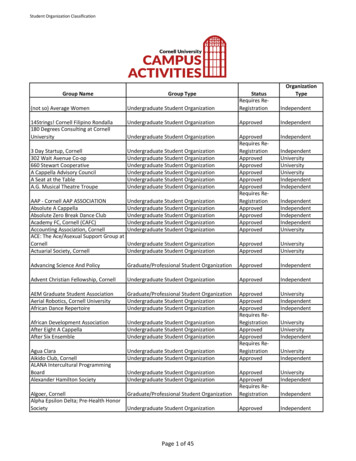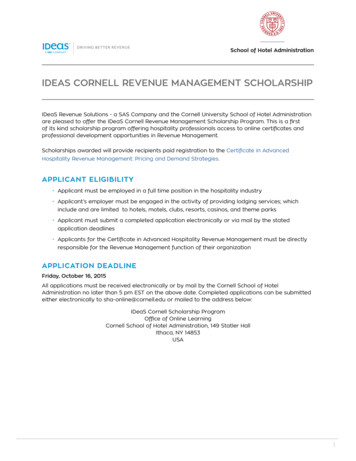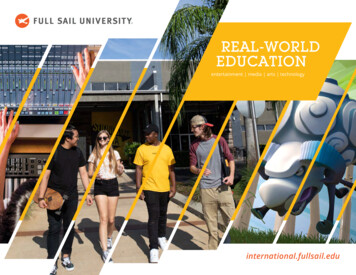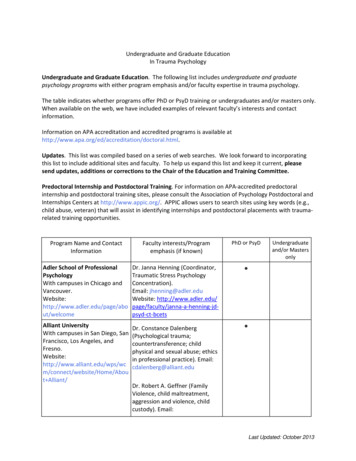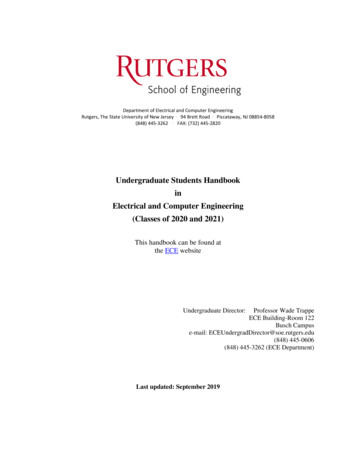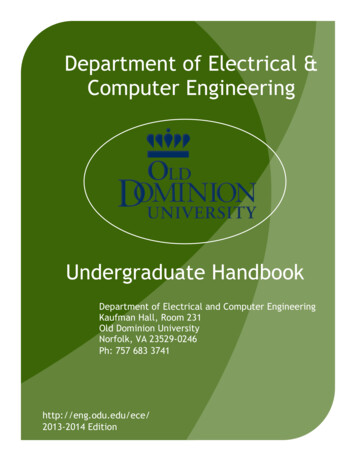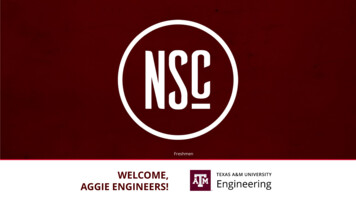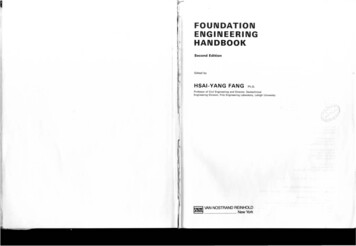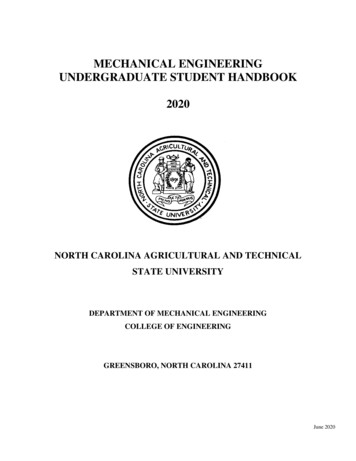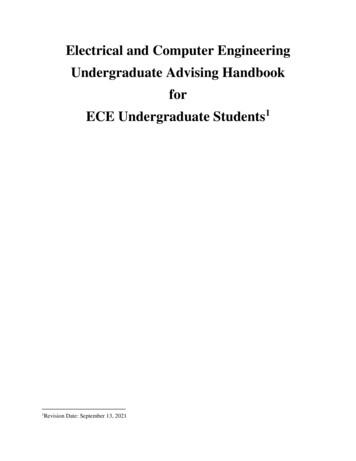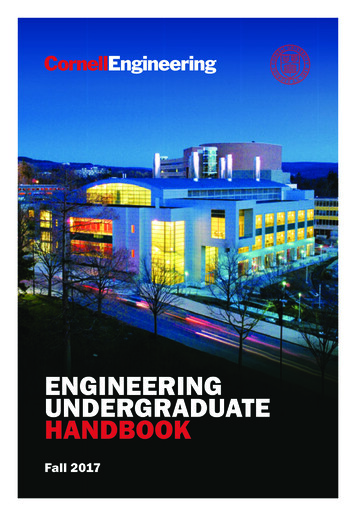
Transcription
ENGINEERINGUNDERGRADUATEHANDBOOKFall 2017
Name:Campus Address:Phone:E-mail:College of EngineeringCornell UniversityABET Accredited Programs for 2017–18ABET is recognized by the Council for Higher Education Accreditation (CHEA)as the organization responsible for the accreditation of educational programsleading to degrees in engineering, engineering technology, computing, and applied science.The following undergraduate-degree programs (majors) are accredited by theEngineering Accreditation Commission of ABET, http://www.abet.org.Biological EngineeringChemical EngineeringCivil EngineeringElectrical and Computer EngineeringEnvironmental EngineeringMaterials Science and EngineeringMechanical Engineering
PrefaceThis handbook is intended to support you as an entering and continuing undergraduatein the College of Engineering at Cornell University. (Some curriculum requirements maynot be relevant to continuing students.) It has been prepared as a reference guide to therequirements, programs, policies, and procedures of the college. We hope that you willfind the information you need for both planning and understanding your engineeringeducation.The College of Engineering would also like to emphasize the importance of the socialand ethical implications of the work of engineers as a contribution to the improvementof society. You are fortunate to be a part of an educational community composed ofpeople from many different parts of the world and from diverse identity groups in theUnited States. This diversity gives Cornell a rich multicultural character, and living inthe Cornell community can be an opportunity to learn respect for the customs of othersand to experience cultural pluralism in today’s world. We encourage you to seek out andexplore courses and activities that address issues of diversity and inclusion to gain a morevaluable educational experience, become more culturally competent, and to prepare forthe practice of engineering.Although this handbook serves as a guide for the development of an undergraduateengineering education, it does not constitute a complete or definitive statement ofthe policies of Cornell University and the College of Engineering. The universityannouncement Courses of Study is the official document of the university for definingacademic programs and requirements. In addition, the final authority for academic degreerequirements of the College of Engineering is jointly administered by the faculty of theCollege of Engineering, the College Curriculum Governing Board (CCGB), and thefaculty of the individual Majors within Engineering. For more complete information,consult the sources mentioned in this handbook, Courses of Study, Major websites, andEngineering Advising in 167 Olin Hall.We hope you find this handbook a useful resource as you progress through your years atCornell. We wish you much success.Engineering AdvisingLiane Fitzgerald, DirectorMelissa Bazley, Associate DirectorRyan DeLany, Assistant DirectorMary Glick, Publications and Program Coordinator1
Responsibility for Meeting Degree RequirementsUltimately, students are responsible for understanding the degree requirements for theirMajors and for planning their courses of study accordingly. They should consult theappropriate undergraduate office (listed on pages 10–11) for more specific information. TheMajor will provide a consultant who can answer specific questions and make bindingdecisions relating to the fulfillment of degree requirements. Faculty advisors will assist incourse selection, but they are not responsible for ensuring that the courses selected meetdegree requirements. That is the responsibility of the student.2
ContentsPreface 1Responsibility for Meeting Degree Requirements 2University and College Mission and Vision 6Cornell University 6College of Engineering Undergraduate Programs 6Guide to Important Resources* 8College of Engineering 8Personal Counseling Services 8Academic Support Services 8Career and Professional Development Services 9Other Resources 9Directors of Undergraduate Studies and Undergraduate Coordinators 10Requirements for the Bachelor of Science Degree 12The Academic Program 13College of Engineering Majors 13Requirements for Graduation 13Residency Requirements 19First-Year Requirements 20Preparing for a Major 20Academic Advising - Roles and Responsibilities 21Student Responsibilities 21Faculty Advisors 21Engineering Advising 22Peer Advisors 23Directors of Undergraduate Studies 23Undergraduate Coordinators 24Additional Engineering Student Services Resources 24Preprofessional Advising 24Diversity Programs in Engineering 25Cornell Engineering Career Center 25Engineering Learning Initiatives 26Engineering Registrar 26University Student Records Policy 27Applying for Major Affiliation 28Major Descriptions, Flow Charts, and Check Lists 28Requirements for Major Affiliation 283
Major Programs 32Major: Biological Engineering (BE) 32Major: Biomedical Engineering (BME) 37Major: Chemical Engineering (ChemE) 43Major: Civil Engineering (CE) 48Major: Computer Science (CS) 53Major: Electrical and Computer Engineering (ECE) 57Major: Engineering Physics (EP) 62Major: Environmental Engineering (EnvE) 66Major: The Independent Major (IM) 71Major: Information Science, Systems, and Technology (ISST) 73Major: Materials Science and Engineering (MSE) 78Major: Mechanical Engineering (ME) 83Major: Operations Research and Engineering (ORE) 88Major: Science of Earth Systems (SES) 92Minors 97Minor: Aerospace Engineering 98Minor: Applied Mathematics 100Minor: Biological Engineering 102Minor: Biomedical Engineering 103Minor: Civil Infrastructure 106Minor: Computer Science 107Minor: Dyson Business Minor for Engineers 107Minor: Electrical and Computer Engineering 109Minor: Engineering Entrepreneurship 109Minor: Engineering Management 111Minor: Engineering Statistics 112Minor: Environmental Engineering 113Minor: Game Design 114Minor: Information Science 116Minor: Materials Science and Engineering 117Minor: Mechanical Engineering 118Minor: Operations Research and Management Science 119Minor: Science of Earth Systems 119Minor: Sustainable Energy Systems 120Special Programs 124Concurrent Degree Option 124Double Majors 124International Engineering Programs 125Engineering Communications Program (ECP) 125Engineering Cooperative Education Program (Co-op) 126Engineering Leadership Program 126Engineering Student Project Teams 126Undergraduate Research 1274
Course Registration 127Registration 127The Course Add/Drop Form 128Adding a Course 128Dropping a Course 128Changing a Grade Option 129Changing Credit Hours 129Course Pre-Enrollment through Student Center 129Maximum Number of Credits per Semester 130Research for Credit vs. Pay 130ROTC Courses 130Grades and Credit 131Grades 131Advanced Placement and Transfer Credit 133Advanced Placement Credit Table 136Transfer Credit 137Academic Standing 139Criteria for Good Standing for Unaffiliated Students 139Criteria for Good Standing in Major Programs 140Academic Actions 143Academic Integrity 144Dean’s List 144Graduating with Distinction 145Major Honors Programs 145Changes in Status 152Petitions 152Time To Degree 152Leaves of Absence 153Rejoining the College After a Leave of Absence 154Extramural Students 155Voluntary Withdrawal 156Changing Engineering Majors 156Internally Transferring to Another College at Cornell 156Change of Name or Address 157Career and Professional Development 157Deciding on a Career 158Career Services at Cornell 158Graduate Programs and Professional Study 159Professional Engineer Licensing 160Student Organizations 1615
University and College Mission and VisionCornell University“I would found an institution where any person can find instruction in any study.” EzraCornell, 1868Cornell is a learning community that seeks to serve society by educating the leaders oftomorrow and extending the frontiers of knowledge.In keeping with the founding vision of Ezra Cornell, our community fosters personal discovery and growth, nurtures scholarship and creativity across a broad range of commonknowledge, and engages men and women from every segment of society in this quest. Wepursue understanding beyond the limitations of existing knowledge, ideology, and disciplinary structure. We affirm the value to individuals and society of cultivation and enrichment of the human mind and spirit.Our faculty, students, alumni, and staff strive toward these objectives in a context of freedom with responsibility. We foster initiative, integrity, and excellence, in an environmentof collegiality, civility, and responsible stewardship. As the land-grant university for thestate of New York, we apply the results of our endeavors in service to our alumni, the community, the state, the nation, and the world.College of Engineering Undergraduate ProgramsThe College of Engineering is dedicated to the transformation of its excellence in researchand design to a correspondingly outstanding educational experience in engineering andapplied science for a diverse group of baccalaureate students.Specific missions are to: enroll and graduate a highly qualified and diverse undergraduate student body andenable their success. continuously improve the quality of the undergraduate education through ongoingevaluation of the common curriculum, assessment of teaching and learning, andimplementation of improvements to the program based on those results. infuse the results of ongoing research, the capabilities of technology, the excitementof hands-on learning, and the experience of design projects into the undergraduatecurricula. provide high-quality information and guidance to undergraduate students about thecollege, curricula, and future employment possibilities. oversee the educational progress of all students and encourage and enhance theirsuccess, both prior to affiliation with a Major and within the Major. collaborate with the faculty and administration of other Cornell colleges,and organizations external to Cornell, to efficiently provide the best possibleundergraduate education.6University and College Mission and Vision
VisionCornell Engineering will utilize the world-class intellectual resources and interdisciplinary opportunities of the college and university to prepare its undergraduate students forlifelong creation of knowledge and solutions to complex real-world problems.ValuesWe believe that all students who enroll in the College of Engineering undergraduate program are capable of successfully graduating with a B.S. degree. We understand that youngpeople in the typical undergraduate age range are maturing rapidly and therefore maychange their professional and personal aspirations, and may struggle with adjustments tocampus life and academic expectations. It is our responsibility to maintain a curricularschedule that allows students to change directions and services to assist them in makinginformed decisions. We respect the variability of learning styles spanned by our studentsand faculty. We embrace the responsibilities of Cornell faculty members for preeminentresearch as well as for excellent undergraduate education. Furthermore, we recognize andfully support the need for everyone in our college community to balance workload andpersonal life. We prize an inclusive, respectful college environment in which communitybonds and community responsibility are emphasized over individual competition.Educational ObjectivesCollege of Engineering graduates will demonstrate early in their careers an ability to: apply their general educational experience and specific knowledge of mathematics,science, and engineering to a wide variety of careers including industry, advancedengineering study, nontraditional engineering-related career paths, and graduatestudy. perform in a modern diverse working environment, working in multidisciplinaryteams and communicating effectively with both professional colleagues and thepublic. lead design processes that include consideration of the impact designs have onpeople, societies, and the environment. model, analyze, and solve complex problems from a systems perspective. identify contemporary global issues and recognize their professional and ethicalresponsibility to contribute to solutions for the social, economic, and environmentalchallenges faced by humanity. engage in self-directed learning, including the pursuit of graduate study andprofessional development activities.Student Learning GoalsIn terms of their general abilities, our graduates will1.2.3.4.Have a broad education, including liberal studies.Be proficient in oral and written communication.Be proficient in information literacy, i.e. be able to locate, evaluate, and effectivelyinterpret claims, theories, and assumptions in science and engineering.Have experience with teamwork.7University and College Mission and Vision
5. Be aware of professional and ethical responsibilities.In terms of their discipline, students will be well grounded in the mathematical, scientific,and engineering skills that are the basis of their discipline. More specifically, our graduates will have:1.2.3.4.The ability to design experiments, analyze the data, and interpret the results.The ability to design, model, and analyze engineering systems.The ability to formulate and solve problems.The ability to use the techniques and tools necessary for the practice of their discipline.Guide to Important Resources**All phone numbers begin with a 607 area code.College of EngineeringOffice of the Dean, 242 Carpenter Hall, 255.4326Associate Dean for Undergraduate Programs, 167 Olin Hall, 255.8240Assistant Dean for Student Services, 167 Olin Hall, 255.8240Cornell Engineering Career Center, 201 Carpenter Hall, 255.5006Cooperative Education Program, 201 Carpenter Hall, 255.5006Diversity Programs in Engineering, 146 Olin Hall, 255.6403Engineering Advising, 167 Olin Hall, 255.7414Engineering Admissions, 102 Hollister Hall, 255.5008Engineering Communications Program, 465 Hollister Hall, 255.7199Engineering Leadership Program, 156 Olin Hall, 255.9074Engineering Learning Initiatives, 167 Olin Hall, 255.9622Engineering Library, Carpenter Hall, 254.6261Engineering Registrar, 158 Olin Hall, 255.7140Engineering Student Project Teams, B27 Upson Hall, 255.1380Personal Counseling ServicesCornell United Religious Work, Anabel Taylor Hall, 255.4214Counseling and Psychological Services, level three, Cornell Health, 255.5208EARS (Empathy, Assistance, and Referral Service), 213 Willard Straight Hall,255.EARSLet’s Talk Walk-in Service, for hours/locations: alk/index.cfmSuicide Prevention and Crisis Service, Ithaca, NY 14850, 272.1616 (24 hrs.)Academic Support ServicesDiversity Programs in Engineering, 146 Olin Hall, 255.6403Engineering Advising, 167 Olin Hall, 255.74148Guide to Important Resources
Engineering Learning Initiatives, 167 Olin Hall, 255.9622Learning Strategies Center, 420 Computing and Communications Center, 255.6310Mathematics Support Center, 256 Malott Hall, 255.3905Office of Undergraduate Biology, 216 Stimson Hall, 255.5233Physics Tutoring, 115 Rockefeller Hall, 255.6310Student Disability Services, 4th floor, Computing and Communications Center,Rm 420, 254.4545Writing Workshop, 174 Rockefeller Hall, 255.6349Career and Professional Development ServicesCornell Career Services, 103 Barnes Hall, 255.5221Cornell Engineering Career Center, 201 Carpenter Hall, 255.5006Engineering Cooperative Education Program, 201 Carpenter Hall, 255.5006Engineering Leadership Program, 156 Olin Hall, 255.9074Engineering Research and Graduate Studies, 223 Carpenter Hall, 255.0976Other ResourcesBursar’s Office, 260 Day Hall, 255.6413, or 255-2336 (student accounts)Campus and Community Engagement, 1501 Dickson Hall, 255.5533Campus Life, 2336 South Balch Hall, 255.5511Continuing Education and Summer Sessions, B20 Day Hall, 255.4987Cornell Health, 110 Ho Plaza, 255.5155Dean of Students Office, 401 Willard Straight Hall, 255.6839Department of Inclusion and Workforce Diversity, 150 Day Hall, 255.3976Financial Aid and Student Employment, 203 Day Hall, 255.5145Housing and Dining Office, 206 Robert Purcell Community Center, 255.5368International Students and Scholars Office, Surge A, 255.5243Judicial Administrator, 120 Day Hall, 255.4680Office of Academic Diversity Initiatives, 200 CCC Building, 255.3841Office of Internal Transfer and Concurrent Degrees, 200 CCC Building, 255.4386Ombudsman, 118 Stimson Hall, 255.4321Student Disability Services, Rm 420, CCC Building, 254.4545University Registrar, B7 Day Hall, 255.42329Guide to Important Resources
Directors of Undergraduate Studies andUndergraduate CoordinatorsA faculty member serves as Director of Undergraduate Studies (DUS) and a staff memberserves as the Undergraduate Coordinator of each Engineering Major. Both can be avaluable source of information for students who want to learn more about their respectiveundergraduate Majors.Director of Undergraduate Study Undergraduate CoordinatorBiological Engineering (BE)Jean Hunter Brenda Marchewkajbh5@cornell.edu bls19@cornell.edu207 Riley-Robb Hall, 255.2297207B Riley-Robb Hall, 255.2173Biomedical Engineering (BME)Jonathan ButcherRyan Sauvejtb47@cornell.edu bmeugrad@cornell.edu304 Weill Hall, 255.3575108 Weill Hall, 254.3368Chemical Engineering (ChemE)T. Michael Duncantmd10@cornell.edu352 Olin Hall, 255.8715Carol Caslercad1@cornell.edu226 Olin Hall, 255.1489Civil Engineering (CE)William PhilpotNadine Porterwdp2@cornell.edu ndp5@cornell.edu223 Hollister Hall, 255.0801221 Hollister Hall, 255.3412Computer Science (CS)Claire Cardieugrad-faculty-director@cs.cornell.edu417 Gates Hall, 255.9206Nicole Roy (students with last names M-Z)nsr1@cornell.edu110E Gates Hall, 255.0982Stella Lee (students with last names A-L)sl2259@cornell.edu110F Gates Hall, 255.7741Electrical and Computer Engineering (ECE)Farhan RanaCharlene A. Leefarhan.rana@cornell.edu cal2@cornell.edu316 Phillips Hall, 255-6317222 Phillips Hall, 255.9442 Engineering Physics (EP)Lena KourkoutisCynthia R. Reynoldslf56@cornell.edu crr8@cornell.edu235 Clark Hall, 255-9121261 Clark Hall, 255.063810Directors of Undergraduate Studies and Undergraduate Coordinators
Environmental Engineering (EnvE)Jery Stedingerjrs5@cornell.edu213 Hollister Hall, 255.2351Nadine Porterndp5@cornell.edu221 Hollister Hall, 255.3412C. Lindsay Andersoncla28@cornell.edu320 Riley-Robb Hall, 255.4533Brenda Marchewkabls19@cornell.edu207B Riley-Robb Hall, 255.2173Independent Major (IM)Michael O. Thompsonmot1@cornell.edu167 Olin Hall, 255.8240Cindy Pakkalacrp5@cornell.edu167 Olin Hall, 255.8240Information Science, Systems, and Technology (ISST)Francois Guimbretierefvg3@cornell.edu241 Gates Hall, 255-6711Ani Mercincavageam2643@cornell.edu110H Gates Hall, 255.9837Cindy Jaycjh6@cornell.edu203 Rhodes Hall, 255.5088Materials Science and Engineering (MSE)Grace Xinggrace.xing@cornell.edu425 Phillips Hall, 255.0605Mechanical Engineering (ME)Elizabeth Fisheremf4@cornell.edu315 Upson Hall, 255.8309Michele Conradmmc2@cornell.edu210A Bard Hall, 255.9159Emily Ivoryeft24@cornell.edu127 Upson Hall, 255.3573Operations Research and Engineering (ORE)Cindy Jaycjh6@cornell.edu203 Rhodes Hall, 255.5088James Renegarassocdir@orie.cornell.edu224 Rhodes Hall, 255-9142Science of Earth Systems (SES)Larry Brownldb7@cornell.edu3120 Snee HallSavannah Williamsss376@cornell.edu2124 Snee Hall, 255.546611Directors of Undergraduate Studies and Undergraduate Coordinators
Requirements for the Bachelor of Science DegreeCategory1.MathematicsCredits14–16MATH 1910, 1920, 2930 or 2940, and a mathematics course chosen by the Major.2.Physics8–12PHYS 1112 and 2213, and, depending on the Major, either PHYS 2214 or a designatedmathematics or science course.3.Chemistry4–8CHEM 2090. Majors in Chemical Engineering or those planning on a health-relatedcareer should take CHEM 2090 and then 2080. Students in EnvironmentalEngineering should take CHEM 2090 and CHEM 1570/3570. Science of EarthSystems Majors should take CHEM 2090 and then 2080/1570.4.First-year writing seminars (two courses)65.Computing (CS 1110, 1112, 1114, or 1115)46.Engineering distributiona. one introduction to engineering (ENGRI) course3b. two distribution courses (ENGRD), one of which may be required by the Major 6–87.Liberal studies distribution (six courses)8.Advisor-approved electives9.Major programa. Major-required courses 186 30b. Major-approved electives9c. courses outside the Major910. In addition to the first-year writing seminars, a technical writing course must be takenas an engineering distribution, liberal studies, Advisor-approved elective, or Majorcourse.11. Two semesters of physical education and demonstration of proficiency in swimming(university requirement).The total number of credits required for graduation vary by Major. Specific requirementsfor each Major are given later in this handbook.12Requirements for the Bachelor of Science Degree
The Academic ProgramCollege of Engineering MajorsIn the first two years, students in the College of Engineering take courses designed to provide a firm foundation for later specialization. These courses conform to the CommonCurriculum, which is established by the College Curriculum Governing Board (CCGB)and administered through Engineering Advising. During the second year, students affiliate with an undergraduate Major (see list below); thereafter, they take courses to satisfythe Bachelor of Science degree in that Major.Biological Engineering (BE)Biomedical Engineering (BME)Chemical Engineering (ChemE)Civil Engineering (CE)Computer Science (CS)Electrical and Computer Engineering (ECE)Engineering Physics (EP)Environmental Engineering (EnvE)Independent Major (IM)Information Science, Systems, and Technology (ISST)Materials Science and Engineering (MSE)Mechanical Engineering (ME)Operations Research and Engineering (ORE)Science of Earth Systems (SES)Requirements for GraduationThe detailed requirements of the Common Curriculum appear in the university announcement Courses of Study, which is revised annually. Students should become familiar withthis material, because they are ultimately responsible for meeting all graduation requirements.The Common Curriculum and the Bachelor of Science degree require a certain number ofcredits in courses belonging to 10 categories.Category 1. MathematicsStudents must earn at least C– in MATH 1910, 1920, 2930 or 2940, and a math course chosen by the Major. Students who do not meet this requirement the first time are expected toimmediately repeat the course and earn a satisfactory grade. Students should not enroll inthe next course in the sequence until they have done so. (A grade lower than C– the secondtime will result in withdrawal from the engineering program.) Courses taken a secondtime to meet this requirement do not yield additional credit toward a degree.13The Academic Program
Category 2. PhysicsStudents are expected to have credit for MATH 1910 before taking PHYS 1112. Similarly,at least C– is required in each subsequent math course before taking the physics course forwhich it is a prerequisite (MATH 1920 is a prerequisite for PHYS 2213; MATH 2930 is aprerequisite or co-requisite for PHYS 2214).Category 3. ChemistryStudents requiring the CHEM 2090–2080 sequence (most often students pursuing Chemical Engineering or pre-health) must enroll in CHEM 2090 during the fall semester of thefirst year so that they may enroll in CHEM 2080 during the spring. Students who do notintend further study in chemistry should enroll in CHEM 2090 during either semester ofthe first year.Category 4. ComputingStudents should enroll in Introduction to Computing (one of CS 1110, 1112, 1114, or 1115)during either semester of the first year.Before CS 111x, some students take CS 1109: Fundamental Programming Concepts, offered only in the summer. CS 1109 may not be used as credit toward graduation.Category 5. First-Year Writing SeminarsDuring each semester of the first year, students are expected to choose a first-year writingseminar from among more than 100 courses offered by more than 30 different departments throughout Cornell. These courses, which offer the benefits of small class size, provide an opportunity to practice writing English prose.Category 6. Technical WritingIn addition to the first-year writing seminars, a technical writing course must be taken asan engineering distribution, liberal studies, Advisor-approved elective, or Major course.All credit-bearing options for fulfilling the requirement (whether they also fulfill a liberalstudies requirement or not) must be taken for a letter grade. Students can petition CCGB’ssubcommittee on technical writing special projects that are not graded, but that is the onlyexception.Students can fulfill the upper-level technical writing requirement in one of the six waysshown below. For more information, see www.engineering.cornell.edu/ECP/.1. ENGRC 3340, ENGRC 3350, ENGRC 3500, taught by the EngineeringCommunications Program.2. The Writing-Intensive Co-op, an opportunity to combine work and academics. Someco-op students do a significant amount of writing on the job, and, under certaincircumstances, this writing may satisfy the college’s technical writing requirementvia petition. (For more information on co-op, see Engineering Cooperative EducationProgram).3. An officially designated writing-intensive (W-I) engineering course. The followinglist represents engineering courses which currently meet the W-I designation, and issubject to change. Students should confirm with their major department that a coursestill satisfies the technical writing requirement prior to enrollment. (Please note: It ismandatory that courses marked with an asterisk [*] be taken with their correspondingone-credit ENGRC component.)14The Academic Program
*AEP/ENGRD 2640: Interfacing the Digital Domain with an Analog World*BEE/MAE 4530: Computer-Aided Engineering: Applications to BiomedicalProcessesBEE 4730: Watershed Engineering*BEE 4890: Entrepreneurial Management for EngineersCHEME 4320: Chemical Engineering Laboratory*CS/INFO 3152: Introduction to Computer Game Architecture*CS/INFO 4152: Advanced Topics in Computer Game DesignINFO 1200: Information Ethics, Law, and PolicyMAE 4272: Fluids/Heat Transfer LaboratoryMSE 4030/4040 (both): Senior Materials Laboratory I and IIMSE 4050/4060 (both): Senior Thesis I and II4. ENGRC 3023, a 1-credit attachment to an engineering course that is not one of theofficially designated W-I courses (see #3 above). An instructor may wish to extend thewriting done in their course for a given semester so that it will fulfill the technicalwriting requirement. With the approval of the CCGB’s Subcommittee on TechnicalWriting, the instructor may have students co-register in ENGRC 3023. (May be takenmore than once, with different courses, by permission of engineering instructor.)5. COMM 3020: Science Writing for the Media, or COMM 3030: OrganizationalWriting, taught by the Department of Communication (in the College of Agricultureand Life Sciences).6. Petition. Occasionally, students will be doing a significant amount and variety oftechnical writing elsewhere in engineering. It may be appropriate to submit a petitionto the CCGB’s Subcommittee on Technical Writing for permission to use theirupcoming writing (not past writing) to meet the technical-writing requirement.Category 7. Engineering DistributionThe Common Curriculum requires three distribution courses (9 credits). One introductionto engineering course (with the course acronym ENGRI) and two distribution courses(with the course acronym ENGRD). Generallly, ENGRDs should be completed by the endof the fourth semester, although some Majors may require additional distribution coursesto be taken after affiliation.The intro-to-engineering course introduces students to the engineering process and provides a substantive experience in open-ended problem-solving. ENGRI courses are expected to be completed by the end of a student’s first year. As ENGRIs are intended primarily for students exploring majors, juniors and seniors may not be able to enroll in ENGRI courses without permission from the course instructor during the add/drop period.Examples of ENGRI courses include the following: (For the most current listing, seeCourses of Study: www.courses.cornell.edu):ENGRI 1100: Lasers and PhotonicsENGRI 1101: Engineering Applications of Operations ResearchENGRI 1120: Introduction to Chemical Engineering15The Academic Program
ENGRI 1130: Sustainable Design for Appledore IslandENGRI 1140: Materials: The Future of EnergyENGRI 1170: Introduction to Mechanical EngineeringENGRI 1190: Introduction to Biological EngineeringENGRI 1200: Introduction to Nanoscience and NanoengineeringENGRI 1210: The Computing Technology Inside Your SmartphoneENGRI 1220: Earthquake!ENGRI 1230: Complexity in the EnvironmentENGRI 1310: Introduction to Biomedical EngineeringENGRI 1510: Modeling and Simulation of Real-World Scientific ProblemsENGRI 1620: Visual Imaging in the Electronic AgeENGRI 1820: Electricity Lights Camera Action: Nanoengineering for the Future ofBits and BytesThe two ENGRD courses (6–8 credits) must be selected from two different categorieslisted below. A student may use any one of the possible substitutions described.1. Scientific ComputingENGRD 2110: Object-Oriented Programming and Data StructuresENGRD 2112: Object-Oriented Design and Data Structures–HonorsENGRD 2140: Computer Systems ProgrammingENGRD 3200: Engineering Computation2. Materials ScienceENGRD 2610: Mechanical Properties of Materials; From Nanodevices toSuperstructuresENGRD 2620: Electronic Materials for the Information Age3. MechanicsENGRD 2020: Statics and Mechanics of SolidsMajors in Engineering Physics may use AEP 3330: Mechanics of Particles and SolidBodies as an ENGRD in this category.4. Probability and StatisticsENGRD 2700: Basic Engineering Probability and Stat
Electrical and Computer Engineering Environmental Engineering Materials Science and Engineering Mechanical Engineering. 1 Preface This handbook is intended to support you as an entering and continuing undergraduate in the College of Engineering
